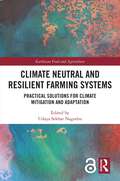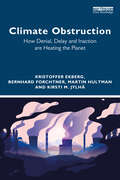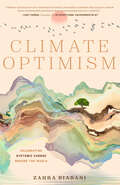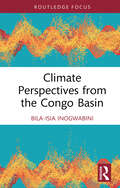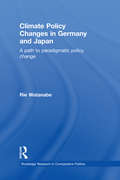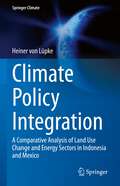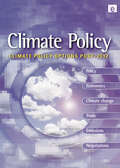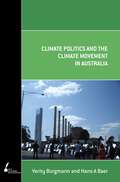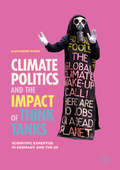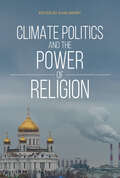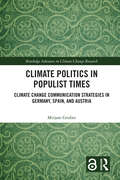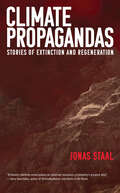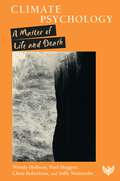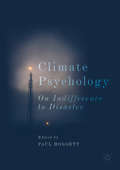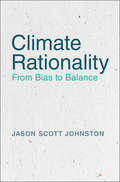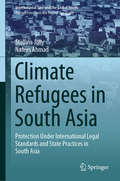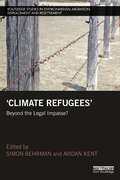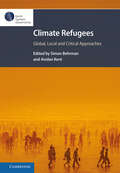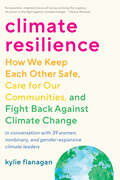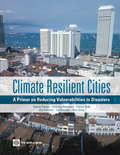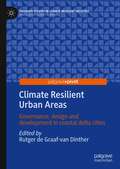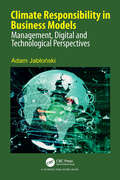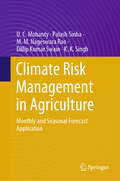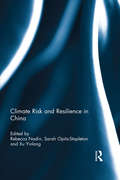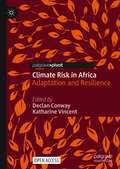- Table View
- List View
Climate Neutral and Resilient Farming Systems: Practical Solutions for Climate Mitigation and Adaptation (Earthscan Food and Agriculture)
by Udaya Sekhar NagothuThis book presents evidence-based research on climate-neutral and resilient farming systems and further to provide innovative and practical solutions for reducing greenhouse gas emissions and mitigating the impact of climate change. Intensive farming systems are a significant source of greenhouse gas emissions, thereby contributing to global warming and the acceleration of climate change. As paddy rice farming is one of the largest contributors, and most environmentally damaging farming systems, this will be a particular focus of the book. The mitigation of greenhouse gas emissions needs to be urgently addressed to achieve the 2 degrees Celsius target adopted by COP21 and the 2015 Paris Agreement, but this is not possible if local and national level innovations are not accompanied by international level cooperation, mutual learning and sharing of knowledge and technologies. This book, therefore, brings together international collaborative research on climate-neutral and resilient farming systems compiled by leading scientists and experts from Europe, Asia and Africa. The chapters present evidence-based research and innovative solutions that can be applied or upscaled in different farming systems and regions across the world. Chapters present models and technologies that can be used for practical implementation at the systemic level and advance state of the art knowledge on carbon neutral farming. Combining theory and practice, this interdisciplinary book provides guidance which can inform and increase cooperation between researchers from various countries on climate-neutral and resilient farming systems. Most importantly, the volume provides recommendations which can be put into practice by those working in the agricultural industry, especially in developing countries, where they are attempting to promote climate-neutral and resilient farming systems. The book will be of great interest to students and academics of sustainable agriculture, food security, climate mitigation and sustainable development, in addition to policymakers and practitioners working in these areas.
Climate Obstruction: How Denial, Delay and Inaction are Heating the Planet
by Bernhard Forchtner Martin Hultman Kristoffer Ekberg Kirsti M. JylhäIn Climate Obstruction: How Denial, Delay and Inaction are Heating the Planet, Kristoffer Ekberg, Bernhard Forchtner, Martin Hultman and Kirsti Jylhä bring together crucial insights from environmental history, sociology, media and communication studies and psychology to help us understand why we are failing to take necessary measures to avert the unfolding climate crisis. They do so by examining the variety of ways in which meaningful climate action has been obstructed. This ranges from denial of the scientific evidence for human-induced climate change and its policy consequences, to (seemingly sincere) acknowledgement of scientific evidence while nevertheless delaying meaningful climate action. The authors also consider all those actions by which often well-meaning individuals and collectives (unintendedly) hamper climate action. In doing so, this book maps out arguments and strategies that have been used to counter environmental protection and regulation since the 1960s by, first and foremost, corporations supported by conservative actors, but also far-right ones as well as ordinary citizens. This timely and accessible book provides tools and lessons to understand, identify and call out such arguments and strategies, and points to actions and systemic and cultural changes needed to avert or at least mitigate the climate crisis.
Climate Optimism: Celebrating Systemic Change Around the World
by Zahra BiabaniA Guide on Climate Optimism and Environmental Sustainability "If you want to be part of the solution, this book is for you.” ―Kip Pastor, founder and CEO of Pique Action#1 New Release in Sustainable Business Development and Environmental PolicyZahra Biabani, a climate activist focused on hope and action, wrote this book to help readers learn why we need to and how we can stay optimistic in the face of the climate crisis. People are doing good things for our planet all over the world…. it's time we highlight it!Change the way you think about the future. The fate of humanity can be daunting, but we don’t need to live in that space. First, we need to change our attitude in order to implement nature based solutions that help mitigate climate change. Good news: there are numerous encouraging environmental trends that will change the way you think about how we can protect the planet. Get to know Zahra Biabani, a climate activist, influencer, CEO, and writer. Zahra’s content focuses on climate hope, optimism, humor, and doing good things. After unexpectedly establishing a career as an online sustainability educator and influencer her junior year at Vanderbilt University, Zahra decided to jump head first into the waters of entrepreneurship and authorship. Climate Optimism is her way to spread hope in the world.Inside, you’ll find:A comprehensive review of the most promising climate solutions Practical advice to change the way you think and feel about climate changeTwo years worth of good news from the “Weekly Earth Wins” series Interviews with activists in the Global South working on projects that further environmental sustainability If you liked Not Too Late, Apocalypse Never, or Unsettled or books for activists centered on environmentalism like A Field Guide to Climate Anxiety, The Intersectional Environmentalist, or Sustainable Badass, you’ll love Climate Optimism.
Climate Perspectives from the Congo Basin (Routledge Focus on Environment and Sustainability)
by Bila-Isia InogwabiniThis book considers the global question of climate change from local perspectives in the context of Central Africa.Bila-Isia Inogwabini examines attempts made by the international community to respond to the global challenges posed by climate change in the Congo Basin and highlights that these attempts have so far produced limited results. Abject poverty and the lack of academic, technical, institutional and governance capacities have made it difficult for these solutions to take root in local conditions. Taking a novel perspective, Inogwabini argues that what is needed is not austerity in the use of natural resources but rather increased material affluence for these communities, which will enable individuals to create their own ways to survive through the tides of climate change. He considers factors including social inertia, climate skepticism and lack of political structure and presents a climate change action plan that is targeted at the local level in the Congo Basin.Overall, this volume will be of great interest to students and scholars of climate change, global development and African studies more broadly.
Climate Policy Changes in Germany and Japan: A Path to Paradigmatic Policy Change (Routledge Research in Comparative Politics)
by Rie WatanabeClimate Policy Changes in Germany and Japan compares two decades of climate policy development in Germany and Japan. It examines whether there is any difference between the types and levels of policy change in the two countries, and, if so, what factors account for the difference. Using a comparison of climate policy changes in Germany and Japan from 1987 to 2005 as a basis, it also discusses the effectiveness and the limits of existing theories of policy change and policy process, most notably the Advocacy Coalition Framework (ACF), Punctuated Equilibrium Approach and Multiple Stream Approach, and explores the theoretical question as to how long-term, paradigmatic policy change takes place. The book lastly presents a hypothetical model of the mechanisms of paradigmatic policy change. The two countries form a useful comparative approach to the issue of climate change. They represent the range of types and levels of changes in policies to control CO2 emissions in the industrial and energy sectors (dependent variables), while also demonstrating similarities in a number of independent variables: the size and structure of their economies; their shares in global GHG emissions; their general policy-making styles, including strong administrative systems and close relationships between ministries and industries; and their general environmental policies. Climate Policy Changes in Germany and Japan will be of interest to students and scholars of environmental and comparative politics.
Climate Policy Integration: A Comparative Analysis of Land Use Change and Energy Sectors in Indonesia and Mexico (Springer Climate)
by Heiner von LüpkeThis book analyzes climate policy integration processes by investigating cause-effect relations in cases of integrating climate policy in energy and land-use sectors of Indonesia and Mexico, taking a novel comparative case study approach. The book identifies root causes for integration outside of the public administration, discussing decisive factors in the political economy of the energy and land-use sectors. Showing how policy windows may open for the successful integration of climate policies nevertheless, the book addresses the need to identify and properly use these windows to establish the administrative and institutional arrangements for effective climate policy implementation. This book offers two-fold insights for overcoming the challenges posed by climate policy integration: Firstly, it contributes to theory-building by amending theories of the policy process and by taking a wider perspective on the role of integration in the context of transformational change processes in emerging economies. Secondly, it sets forth a set of research-based practical policy recommendations on how to foster climate policy integration in the political decision-making processes as well as the public administration structures. Therefore, this book will appeal to scholars and researchers of public policy, public administration, political science, and environmental sciences, as well as policy-makers and practitioners interested in a better understanding of climate policy integration in energy and land-use sectors.
Climate Policy Options Post-2012: European strategy, technology and adaptation after Kyoto (Climate Policy Series #Vol. 5)
by Bert Metz Mike Hulme the Netherlands Tyndall CentreThis special issue of the Climate Policy journal addresses the following key questions: * What long-term range of policies for climate change adaptation and mitigation should Europe pursue to adequately enhance sustainability on a global level? * What are the implications of long-term European climate strategy for the design of a global post-2012 climate regime? * What are the key concerns of different stakeholders and how will these concerns impact on long-term climate policy? These questions were discussed during two workshops, commissioned by the European Forum on Integrated Environmental Assessment (EFIEA) and jointly organized by the National Institute of Public Health and the Environment (RIVM), The Netherlands and the Tyndall Centre for Climate Change Research, UK. Selected papers from these workshops were adapted and peer-reviewed for publication. International experts offer detailed policy analysis and review the links between policy and economics, sustainable development, technology and adaptation. Also included are introductory and concluding remarks from the guest editors, highlighting key points and offering an expert synthesis of the workshop discussions. This will be invaluable reading for professionals, researchers and academics interested in climate change and climate policy, policy makers, policy analysts, energy consultants, and representatives from industry planning their own long-term energy strategies.
Climate Politics and the Climate Movement in Australia
by Verity Burgmann Hans A BaerClimate change is the hottest topic of the twenty-first century and the climate movement a significant global social movement. This book examines the broad context of Australian climate politics and the place of the climate movement within it. Acting 'from above' are the most powerful forces; corporations and governments, both Labor and Coalition; with the media framing the issues. Climate movement actors 'in the middle' include the Australian Greens, major environmental and climate organisations, public intellectuals, think-tanks, academics and the union movement. Acting 'from below' are the numerous local climate action groups and various regional and national networks. This lowest level is the primary location of the climate movement: and grassroots mobilisation the source of its vitality. Burgmann and Baer's study offers a vision for an alternative Australia based upon the principles of social equity and environmental sustainability.
Climate Politics and the Impact of Think Tanks: Scientific Expertise In Germany And The Us
by Alexander RuserThis book provides an innovative theoretical and analytical framework for studying the role and impact of specialized research organizations and consultancies on decision making in climate politics. It includes advanced empirical analysis of the case of Germany, compared with the situation in the USA. The book improves the understanding of the role and impact of ‘scientific’ advice in coping with the challenge of anthropogenic climate change.
Climate Politics and the Power of Religion
by Ken Conca Andrew Thompson Ana Mariella Bacigalupo Kelly D. Alley J. Brent Crosson David T. Buckley Roger-Mark De Souza Neeraj VedwanHow does our faith affect how we think about and respond to climate change?Climate Politics and the Power of Religion is an edited collection that explores the diverse ways that religion shapes climate politics at the local, national, and international levels. Drawing on case studies from across the globe, it stands at the intersection of religious studies, environment policy, and global politics.From small island nations confronting sea-level rise and intensifying tropical storms to high-elevation communities in the Andes and Himalayas wrestling with accelerating glacial melt, there is tremendous variation in the ways that societies draw on religion to understand and contend with climate change. Climate Politics and the Power of Religion offers 10 timely case studies that demonstrate how different communities render climate change within their own moral vocabularies and how such moral claims find purchase in activism and public debates about climate policy. Whether it be Hindutva policymakers in India, curanderos in Peru, or working-class people's concerns about the transgressions of petroleum extraction in Trinidad—religion affects how they all are making sense of and responding to this escalating global catastrophe.
Climate Politics in Populist Times: Climate Change Communication Strategies in Germany, Spain, and Austria (Routledge Advances in Climate Change Research)
by Mirjam GruberThis book navigates the neglected territory where far-right populism intersects with climate change, presenting a nuanced examination that transcends traditional research boundaries.In recent decades, Europe has grappled with the surge of far-right and populist movements, fueling robust academic debates. Simultaneously, the global discourse on climate change has become increasingly pervasive in societal and political spheres. This book provides a comprehensive exploration of how populist far-right parties discuss climate change within their national contexts, focusing on Germany, Spain, and Austria. Using a meticulous methodology rooted in critical discourse studies, Mirjam Gruber examines the perspectives on climate change held by mainstream parties thereby defining the national policy field. Gruber then delves into the discourse about climate change of populist far-right parties, revealing a complex web of obstructionist arguments intricately tied to the national policy context. By analyzing a diverse array of documents spanning five years, including social media posts, press releases, parliamentary debates, and policy documents, Gruber uncovers a stark contrast between the willingness of mainstream parties to address climate concerns and the obstructionist rhetoric employed by their far-right counterparts. This illuminating exploration underscores the importance of context in understanding political communication and provides profound insights into how different nations frame the climate change narrative.Climate Politics in Populist Times will be of great interest to students and scholars of climate change, environmental politics, climate change communication and populist far-right ideologies.
Climate Propagandas: Stories of Extinction and Regeneration
by Jonas StaalHow climate propaganda narratives shape our (mis)understanding of the world, and how to propagate a future of repair and regeneration instead.In Climate Propagandas, Jonas Staal reveals the propaganda narratives—and the divergent realities they evoke—that shape the climate crisis in the public imaginary. It is often said that the climate crisis is a planetary one, but the devastating impact of climate crisis is distributed unequally and its related ideological positions are as vast as they are irreconcilable. A liberal might argue the crisis is the result of individual consumer behavior, whereas a libertarian sees an opportunity for geoengineering markets. A conspiracist might not believe the climate is at risk, whereas an ecofascist sees a chance to double down on the argument about who has the superior racial right to survive extinction.With an artist&’s eye and an activist&’s sense of urgency, Staal explores how these stories are told and visualized through popular film and television, internet culture, climate fiction, art, architecture, and industrial design. If life-threatening propaganda narratives have conjured our present climate catastrophe, Staal suggests, then surely stories of regeneration can propagate new planetary futures for all. His book identifies narratives that don&’t follow the path of mass extinction, but rather seek repair and regeneration of a world in crisis.
Climate Psychology: A Matter of Life and Death
by Wendy Hollway Paul Hoggett Chris Robertson Sally WeintrobeClimate Psychology offers ways to work with the unthinkable and emotionally unendurable current predicament of humanity. The style and writing interweave passion and reflection, animation and containment, radical hope and tragedy to reflect the dilemmas of our collective crisis. The authors model a relational approach in their styles of writing and in the book's structure. Four chapters, each with a strikingly original voice and insight, form the core of the book, held either end by two jointly written chapters. In contrast to a psychology that focuses on individual behaviour change, the authors use a transdisciplinary mix of approaches (depth psychology and psychotherapy, earth systems, deep ecology, cultural sociology, critical history, group and institutional outreach) to bring into focus the predicament of this period. While the last decade required a focus on climate denial in all its manifestations (which continues in new ways), a turning point has now been reached. Increasingly extreme weather across the world is making it impossible for simple avoidance of the climate threat. Wendy Hollway, Paul Hoggett, Chris Robertson, and Sally Weintrobe address how climate psychology illuminates and engages the life and death challenges that face terrestrial life. This book will appeal to three core groups. First, mental health and social care professionals wanting support in containing and potentially transforming the malaise. Second, activists wanting to participate in new stories and practices that nurture their engagement with the present social and cultural crisis. Third, those concerned about the climate emergency, wanting to understand the deeper context for this dangerous blindness.
Climate Psychology: On Indifference to Disaster (Studies in the Psychosocial)
by Paul HoggettThis book investigates the psycho-social phenomenon which is society’s failure to respond to climate change. It analyses the non-rational dimensions of our collective paralysis in the face of worsening climate change and environmental destruction, exploring the emotional, ethical, social, organizational and cultural dynamics to blame for this global lack of action. The book features eleven research projects from four different countries and is divided in two parts, the first highlighting novel methodologies, the second presenting new findings. Contributors to the first part show how a ‘deep listening’ approach to research can reveal the anxieties, tensions, contradictions, frames and narratives that contribute to people’s experiences, and the many ways climate change and other environmental risks are imagined through metaphor, imagery and dreams. Using detailed interview extracts drawn from politicians, scientists and activists as well as ordinary people, the second part of the book examines the many different ways in which we both avoid and square up to this gathering disaster, and the many faces of alarm, outrage, denial and indifference this involves.
Climate Rationality: From Bias to Balance
by Jason S. JohnstonMost environmental statutes passed since 1970 have endorsed a pragmatic or 'precautionary' principle under which the existence of a significant risk is enough to trigger regulation. At the same time, targets of such regulation have often argued on grounds of inefficiency that the associated costs outweigh any potential benefits. In this work, Jason Johnston unpacks and critiques the legal, economic, and scientific basis for precautionary climate policies pursued in the United States and in doing so sheds light on why the global warming policy debate has become increasingly bitter and disconnected from both climate science and economics. Johnston analyzes the most influential international climate science assessment organizations, the US electric power industry, and land management and renewable energy policies. Bridging sound economics and climate science, this pathbreaking book shows how the United States can efficiently adapt to a changing climate while radically reducing greenhouse gas emissions.
Climate Refugees in South Asia: Protection Under International Legal Standards and State Practices in South Asia (International Law and the Global South)
by Stellina Jolly Nafees AhmadThis book addresses the forms of legal protection extended to people displaced due to the consequences of climate change, and who have either become refugees by crossing international borders or are climatically displaced persons (CDPs) in their own homelands. It explores the legal response of the South Asian Jurisdictions to these refugee-like situations, and also to what extent these people are protected under current international law. The book critically examines and assesses whether States have obligations to protect people displaced by climate change under international refugee law (IRL) and international climate change law (ICCL). It discusses the issue of climate migration in South Asia, analyzes the legal and judicial response initiated by South Asian nations, and also investigates the role of SAARC in relation to climate change and climate refugees. Drawing on the International Legal Standards and States’ Practices in South Asia regarding climate refugees, the book shows how IRL, ICCL, and IHRL (international human rights law) have been used to address and identify the gaps in the global legal protection framework concerning the contours of the normative debate on climate refugees, climate change displacement, migration, forced migration, susceptibility to climate change, typology of climate change-induced displacement, role of the SAARC and its municipal legal systems, approaches to climate change, human mobility and developing a hybrid regional law, or advocating a legal alternative of equal measure in a region characterized by diversity and multiculturalism. The book offers valuable takeaways for students, researchers, consultants, practitioners and policymakers alike.
Climate Refugees: Beyond the Legal Impasse? (Routledge Studies in Environmental Migration, Displacement and Resettlement)
by Avidan Kent Simon BehrmanCurrent estimates of the numbers of people who will be forced from their homes as a result of climate change by the middle of the century range from 50 to 200 million. Therefore, even the most optimistic projections envisage a crisis of migration that will dwarf any we have seen so far. And yet attempts to develop legal mechanisms to deal with this impending crisis have reached an impasse that shows little sign of being overcome. This is in spite of the rapidly growing academic study and policy development in the area of climate change generally. 'Climate Refugees': Beyond the Legal Impasse? addresses a fundamental gap in academic literature and policy making – namely the legal ‘no-man’s land’ in which the issue of climate refugees currently resides. Past proposals for the regulation of climate-induced migration are evaluated, inter alia by their original authors, and the volume also looks at current attempts to regulate climate-induced migration, including by officials from the International Organization for Migration (IOM), the office of the United Nations High Commissioner for Refugees (UNHCR) and the Platform on Displacement Disaster (PDD). Bringing together experts from a variety of academic fields, as well as officials from leading international organisations, this book will be of great interest to students and researchers of Environmental Law, Refugee Law, Human Rights Law, Environmental Studies and International Relations.
Climate Refugees: Global, Local and Critical Approaches
by Avidan Kent Simon BehrmanThe last few years have witnessed a flurry of activity in global governance and international lawseeking to address the protection gaps for people fleeing the effects of climate change. This book discusses cutting-edge developments in law and policy on climate change and forced displacement, including theories and potential solutions, issues of governance, local and regional concerns, and future challenges. Chapters are written by a range of authors from academics to key figures in intergovernmental organisations, and offer detailed case studies of policy developments in the Americas, Europe, South-East Asia, and the Pacific. This is an ideal resource for graduate students and researchers from a range of disciplines, as well as policymakers working in environmental law, environmental governance, and refugee and migration law. This is one of a series of publications associated with the Earth System Governance Project. For more publications, see www.cambridge.org/earth-system-governance.
Climate Resilience: How We Keep Each Other Safe, Care for Our Communities, and Fight Back Against Climate Change
by Kylie FlanaganAn intersectional primer for saving the planet: place-based perspectives and community-led tools for fighting climate change—for readers of The Intersectional Environmentalist and All We Can Save"An essential, inspired chorus of voices echoing the urgency of action in the fight against climate change." —Kirkus ReviewsIn Climate Resilience, climate justice and resilience strategist Kylie Flanagan invites us to see and act beyond status-quo solutions, Big Tech promises...and everything we&’re usually told about how to save the planet.Centering the voices of Native Rights activists, queer liberation ecologists, youth climate-justice organizers, Latinx wilderness activists, and others on the front lines, Climate Resilience urges us toward a vision of climate care that invests in place-based, community-led projects focused on:Relationship RepairEcological RestorationEconomic RegenerationCollective CareCommunity AdaptationCultural StrategyPeople PowerEach section offers practical blueprints for engaging with different aspects of climate-change action through mutual aid, seed-saving, community-owned energy, community safety plans, and more, and includes a range of ideas for readers to apply these strategies in their own communities.
Climate Resilient Cities: A Primer on Reducing Vulnerabilities to Disasters
by Federica Ranghieri Fatima Shah Earl Kessler Neeraj Prasad Zoe Trohanis Ravi Sinha'Climate Resilient Cities: A Primer on Reducing Vulnerabilities to Disasters' provides city administrators with exactly what they need to know about the complex and compelling challenges of climate change. The book helps local governments create training, capacity building, and capital investment programs for building sustainable, resilient communities. A step-by-step self-assessment challenges policymakers to think about the resources needed to combat natural disasters through an innovative "hot spot" risk and vulnerability identifi cation tool. This primer is unique from other resources in its treatment of climate change using a dual-track approach that integrates both mitigation (lowering contributions to greenhouse gases) and adaptation (preparing for impacts of climate change) with disaster risk management. The book is relevant both to cities that are just beginning to think about climate change as well as those that already have well established policies, institutions, and strategies in place. By providing a range of city-level examples of sound practices around the world, the book demonstrates that there are many practical actions that cities can take to build resilience to climate change and natural disasters.
Climate Resilient Urban Areas: Governance, design and development in coastal delta cities (Palgrave Studies in Climate Resilient Societies)
by Rutger de Graaf-van DintherThis book describes the urgent challenge faced by cities worldwide to become resilient to climate change impacts. This challenge goes further than the ability to resist the impacts of extreme weather conditions. Coping with climate impacts and the ability to recover from them are equally important, as well as the capacity to adapt to the effects of climate change and the ability to transform the entire urban system. The book explores how the resilience journey for coastal cities in particular encompasses using scientific knowledge but also the knowledge of citizens and practitioners. Measures and strategies on different scales are needed, from national scale all the way down to neighbourhood, street level and building level. Representing the holistic nature of climate resilience, this collection contains unique insights from leading scientists and practitioners in areas of expertise such as engineering, social sciences and urban design. It will be a valuable resource for scholars, students, practitioners and policy makers interested in the development of resilient and sustainable urban environments.
Climate Responsibility in Business Models: Management, Digital and Technological Perspectives
by Adam JabłońskiThe book provides expertise in strategic climate management in relation to the modern principles of digital and climate transformation examined through the concept of business models. This monograph aims to broadly illustrate the complexity of the issue presented through climate responsibility shaped at the level of business, the economy and society. As part of the presented model, a closed cycle of implementing the principles of climate responsibility in business models focused on management, digital and technological perspectives were identified.This proposed model is described in detail in this scientific monograph. The aim of the monograph is to indicate the theoretical and practical determinants of building and creating the principles of climate responsibility embedded in business models by developing management mechanisms open to digital and technological perspectives.
Climate Risk Management in Agriculture: Monthly and Seasonal Forecast Application
by U. C. Mohanty Palash Sinha M. M. Nageswara Rao Dillip Kumar Swain K. K. SinghSustainable agricultural production is vital for food security and agricultural productivity. It is greatly influenced by weather and climate conditions. This book focuses on understanding weather and climate systems and crop yield productions, including integrated weather-crop prediction systems for climate risk management in agriculture. It examines the impact of climate change and its variability on different crops, and possible ways to minimize the loss for farmers. This book also describes different weather and climate hazards, including the fundamentals of weather/climate prediction systems and numerical weather prediction (NWP) models. It presents the need for seamless weather/climate predictions and their impact on agriculture. The status and availability of different monthly and seasonal scale forecasts worldwide is explored and how the forecasting models or products can be evaluated using statistical methods. The book concisely elucidates systematic model bias removal techniques and a reliable approach based on multi-statistics in producing a single forecast from the multi-model grand ensemble. Since crop models need daily weather sequence, several standard disaggregation methods for generating daily weather sequences from monthly/seasonal products are presented. This book describes several aspects that are needed for agricultural practices and crop modelling. It encapsulates different components of crop models and their application, preparation methods of Crop Weather Calendar, application of disaggregated weather sequence in crop models, and generation of Climate Risk Matrices (CRM). A detailed methodology is presented for hands-on practice, including downloading and processing data, model evaluation and bias corrections, generating a single forecast, disaggregation, and preparing CRM based on crop model products. This book contains a total 11 chapters and appeals to students, researchers, scientists, and operational agencies.
Climate Risk and Resilience in China
by Rebecca Nadin Sarah Opitz-Stapleton Xu YinlongChina has been subject to floods, droughts and heat waves for millennia; these hazards are not new. What is new is how rapidly climate risks are changing for different groups of people and sectors. This is due to the unprecedented rates of socio-economic development, migration, land-use change, pollution and urbanisation, all occurring alongside increasingly more intense and frequent weather hazards and shifting seasons. China’s leadership is facing a significant challenge – from conducting and integrating biophysical and social vulnerability and risk assessments and connecting the information from these to policy priorities and time frames, to developing and implementing policies and actions at a variety of scales. It is within this challenging context that China’s policy makers, businesses and citizens must manage climate risk and build resilience. This book provides a detailed study of how China has been working to understand and respond to climatic risk, such as droughts and desertification in the grasslands of Inner Mongolia to deadly typhoons in the mega-cities of the Pearl River Delta. Using research and data from a wide range of Chinese sources and the Adapting to Climate Change in China (ACCC) project, a research-to-policy project, this book provides a fascinating glimpse into how China is developing policies and approaches to manage the risks and opportunities presented by climate change. This book will be of interest to those studying global and Chinese climate change policy, regional food, water and climate risk, and to policy advisors.
Climate Risk in Africa: Adaptation and Resilience
by Declan Conway Katharine VincentThis open access book highlights the complexities around making adaptation decisions and building resilience in the face of climate risk. It is based on experiences in sub-Saharan Africa through the Future Climate For Africa (FCFA) applied research programme. It begins by dealing with underlying principles and structures designed to facilitate effective engagement about climate risk, including the robustness of information and the construction of knowledge through co-production. Chapters then move on to explore examples of using climate information to inform adaptation and resilience through early warning, river basin development, urban planning and rural livelihoods based in a variety of contexts. These insights inform new ways to promote action in policy and praxis through the blending of knowledge from multiple disciplines, including climate science that provides understanding of future climate risk and the social science of response through adaptation.The book will be of interest to advanced undergraduate students and postgraduate students, researchers, policy makers and practitioners in geography, environment, international development and related disciplines.
